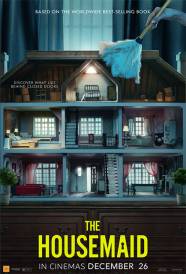Harry Potter Filmmakers Interview David Yates, David Heyman & Michael Goldenberg
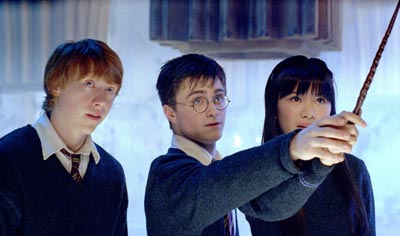
THE MAKING OF A POTTER.
David Yates, David Heyman and Michael Goldenberg Interviewed by Paul Fischer.
Opening last week is the most anticipated sequel of the summer: Harry Potter and the Order of the Phoenix. The magical thriller is the fifth book in thhe series and many are saying the film version is the best so far as it balances between exploring issues of adolescence angst, against themes of rebellion, authoritarianism and of course the nature of darkness that lay within. Screenwriter Michael Goldenberg, director David Yates and producer David Heyman discussed bringing this fifth book to cinematic life with an eager media contingent, including Paul Fischer.
Paul Fischer: People were surprised when you were announced as the director of this movie and to your credit, you pulled it off. What were the challenges for you?
David Yates: Initially it's pretty scary. When you go to Leavesden which is where these movies are shot, the scale of the enterprise is just enormous. I went to see Mike in New York shoot "Goblet of Fire" for half a day and it feels like you're walking into this Roman arena. It's massive. You've got butterflies in your tummy to begin with, but I really, really quickly found my feet really. I think what you do is you just learn to prioritise what's the most important thing for you to focus on as a director and for me it was working with Michael on the screenplay, pushing the performances and putting a creative team together which is a kind of combination of people I've worked with before and people who had already done some "Potter." Actually, it's an incredibly safe environment. That's what I'd say about "Potter." David Heyman and David Barron are both incredibly supportive. The studio was very excited by the dailies so I felt actually quickly very, very confident about the whole thing and I had a great time doing it really.
Paul Fischer: How do you think the Potter movies would be with an American production?
David Heyman: I have no idea. I don't really think about that. It was never really a possibility. There was one mention when we were at the very beginning stages of developing the project before the books had any degree of success somebody suggested 'well maybe we could move to America,' but that was literally one mention and was immediately discarded. Where I think we've been very fortunate with our kids is that the environment at Leavesden is very removed from everything. It's a little bubble and I think that provides a form of protection. You saw the kids of here. They're remarkably unaffected. They're kids. They're quite grown up kids. Quite composed. But, they're having a good time. They're not cynical, they're not pretentious, they're not arrogant. They're humble and frankly very much the same kids that I loved when I began the process. You know I have no idea. There are some young wonderful American actors who are unscathed and I know ours have remained unscathed so far and we're very lucky to have them on board.
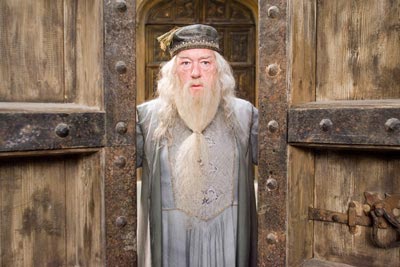 Paul Fischer: As filmmakers, what is your mindset towards viewers who haven't seen previous movies and don't know much about the world, do you feel the need to give certain background information?
Paul Fischer: As filmmakers, what is your mindset towards viewers who haven't seen previous movies and don't know much about the world, do you feel the need to give certain background information?
David Yates: I think to a certain extent I have to feel that the audience is going to bring a certain knowledge to the movies when they walk through the door, but at the same time, we were very aware that this film try to make it as self-contained as we possibly could, to make it feel like a story in its own right. There's inevitable connective tissue. Michael will probably tell you more about this, but the adaptive process is quite tricky. The worst thing you can do in a movie is take the audience out of the moment. Once you start referring back to things that are relevant to the story you're telling or try to predict things that might be coming, it tends to fall into the expositional and that's not great for theatrical experience. We try to put as much of that out as possible in this movie.
Michael Goldenberg: David was quite wonderfully ruthless of that. I don't know if that comes from thrillers, you know that sort of keeping it very much in the moment and keeping everything on a need to know basis which is generally hard to do anyway. We pushed the limit on that I think and the question was, 'do you absolutely need it? Does it make sense for the context? Can you use that information without spelling it out?' Just streamlining everything as much as possible and it's amazing how much information you get in a frame. How much your mind fills in even if you're not up to speed on the specifics. I think David was right about that and it gives the film a vitality that it wouldn't have otherwise.
Paul Fischer: Since you're going to be directing the next "Harry Potter," what are your plans for the sixth film?
David Yates: One thing we said when we finished "Order of the Phoenix" was that we want a very different experience next time around. We're very proud of this film, the intensity, the emotion and everything. One of the great things Jo Rowling does in the book is that she captures stages of childhood so the next stage of childhood is a bit more sex, drugs and rock and roll.
David Heyman: No drugs.
David Yates: It's about the kind of emotional and sexual politics of being a teenager. It's a very different swing, the next film. I think it needs to be for the series to keep evolving. In my work, every choice I've made I've always gone for something in the neurotically opposite direction. Once I've finished something, I've stayed keen to stay fresh as a story teller to try something different. The "Potter" world is so rich. They're so many things to play with in that world that it's possible to regear so the next one will be very different I think.
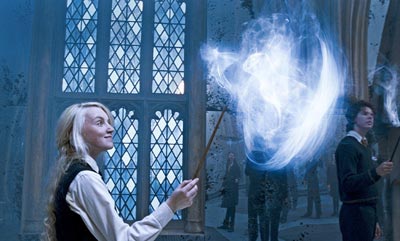 Paul Fischer: Are you prepared to tweak the sixth film based on anything you learn in the seventh book?
Paul Fischer: Are you prepared to tweak the sixth film based on anything you learn in the seventh book?
David Yates: We'd be crazy not to take a look at the seventh book and not let us influence us as we're refining the sixth script. I think there may be things that could be really helpful so we'll be looking at it as soon as it comes out.
David Heyman: But, at the same time, in a way it's foreshadowing. If you look at this film, there are occasional looks by Ginny which foreshadow the relationship between her and Harry. For the most part, I think with each of the films we try to keep them true to themselves. We don't bring four into three and three into two and two into one. They are self- contained units just the way they're books that work on their own terms, but inevitably we will look at seven and there will be things. Even in this one actually that we cut out that when we showed the script to Jo she was like, 'I wouldn't do that if I were you.' So that taps us back in.
Paul Fischer: Have any of you been fortunate enough to read the seventh book and if not, when and where will you be reading it?
Michael Goldenberg: We've loved to have read it, but unfortunately we'll read it at the same time as everyone else.
Paul Fischer: When you have such a hardcore fan base the way "Potter" does who seem to know every word in the books, do you tamper with that in the screenplay? Also, what was it like to have a die hard fan like Evanna Lynch looking over your shoulder?
Michael Goldenberg: Certainly you can't not be aware of all of those fans out there, but we're all fans ourselves. From the very beginning it was very liberating because from the first time, we met with Jo she gave us permission to do whatever was necessary to make a great film. She told us she wants to see a great movie and understands that now more than anybody what you need to do to translate from one medium to another. It felt like we were on pretty solid terrority there. When we started we wanted to keep up with the spirit of the books and to make the best possible movie and version of that story.
David Yates: I think ultimately the ambition is to kind of reflect that spirit because you inevitably have to loose things along the way to service a theatrical experience for an audience. Evanna was just utterly delightful to be around. I'm sure she knows more than J.K. Rowling. She's just a formidable mind of information. She's very sweet and very lovely and she really knew Luna inside and out. I was able to lean on that and we were able to have very frank conservations about what Luna would and wouldn't do. She's just so delightful and she's a natural actor. That's what was really delightful about her is that you can't see the acting. That's my favorite kind of acting actually.
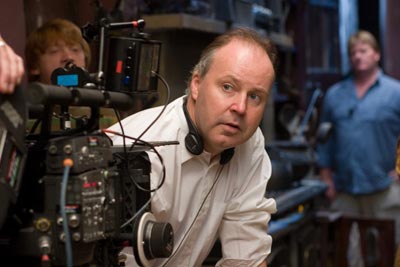 Paul Fischer: You've adapted both "Contact" and very recently "Peter Pan." How did those projects help you adapt "Potter"?
Paul Fischer: You've adapted both "Contact" and very recently "Peter Pan." How did those projects help you adapt "Potter"?
Michael Goldenberg: Well you always learn as you go on every time. For me they're not that different in that all those films deal with a very heightened realities that are based in real characters and rooted in a real reality. It's that wonderful tension between the incredible believability and realism that David brought to "Order of the Phoenix" verses that incredible heightened world and there's something about that science fiction or fantasy working as a metaphor for those inner dramas.
Paul Fischer: Are there a lot of deleted scenes in this film and what we can look forward to on the DVD?
David Yates: We actually didn't lose that much it's really interesting because we had such a tight script going in. There are about a half of dozen scenes that are going to be on the DVD extras. There's a really sweet scene with Emma Thompson who plays Trelawney. I just did this improvised scene with her while she's eating dinner while Imelda is doing the big speech in the great hall. Emma does this whole comedic routine where you know she's very short sided so she ends up spilling her dinner all over and it goes on for about three minutes. It's really Chaplinesque actually. Obviously there was no room in the film for that so we've stuck it on the DVD extras. There's a terrific scene with Imelda and Emma when Imelda is kind of assessing Trelawney and we montage that whole scene in the cut. It's actually a self-contained scene in its own right. It's actually very funny. And then three or four other things that are quite fun.
Opening last week is the most anticipated sequel of the summer: Harry Potter and the Order of the Phoenix. The magical thriller is the fifth book in thhe series and many are saying the film version is the best so far as it balances between exploring issues of adolescence angst, against themes of rebellion, authoritarianism and of course the nature of darkness that lay within. Screenwriter Michael Goldenberg, director David Yates and producer David Heyman discussed bringing this fifth book to cinematic life with an eager media contingent, including Paul Fischer.
Paul Fischer: People were surprised when you were announced as the director of this movie and to your credit, you pulled it off. What were the challenges for you?
David Yates: Initially it's pretty scary. When you go to Leavesden which is where these movies are shot, the scale of the enterprise is just enormous. I went to see Mike in New York shoot "Goblet of Fire" for half a day and it feels like you're walking into this Roman arena. It's massive. You've got butterflies in your tummy to begin with, but I really, really quickly found my feet really. I think what you do is you just learn to prioritise what's the most important thing for you to focus on as a director and for me it was working with Michael on the screenplay, pushing the performances and putting a creative team together which is a kind of combination of people I've worked with before and people who had already done some "Potter." Actually, it's an incredibly safe environment. That's what I'd say about "Potter." David Heyman and David Barron are both incredibly supportive. The studio was very excited by the dailies so I felt actually quickly very, very confident about the whole thing and I had a great time doing it really.
Paul Fischer: How do you think the Potter movies would be with an American production?
David Heyman: I have no idea. I don't really think about that. It was never really a possibility. There was one mention when we were at the very beginning stages of developing the project before the books had any degree of success somebody suggested 'well maybe we could move to America,' but that was literally one mention and was immediately discarded. Where I think we've been very fortunate with our kids is that the environment at Leavesden is very removed from everything. It's a little bubble and I think that provides a form of protection. You saw the kids of here. They're remarkably unaffected. They're kids. They're quite grown up kids. Quite composed. But, they're having a good time. They're not cynical, they're not pretentious, they're not arrogant. They're humble and frankly very much the same kids that I loved when I began the process. You know I have no idea. There are some young wonderful American actors who are unscathed and I know ours have remained unscathed so far and we're very lucky to have them on board.
 Paul Fischer: As filmmakers, what is your mindset towards viewers who haven't seen previous movies and don't know much about the world, do you feel the need to give certain background information?
Paul Fischer: As filmmakers, what is your mindset towards viewers who haven't seen previous movies and don't know much about the world, do you feel the need to give certain background information?David Yates: I think to a certain extent I have to feel that the audience is going to bring a certain knowledge to the movies when they walk through the door, but at the same time, we were very aware that this film try to make it as self-contained as we possibly could, to make it feel like a story in its own right. There's inevitable connective tissue. Michael will probably tell you more about this, but the adaptive process is quite tricky. The worst thing you can do in a movie is take the audience out of the moment. Once you start referring back to things that are relevant to the story you're telling or try to predict things that might be coming, it tends to fall into the expositional and that's not great for theatrical experience. We try to put as much of that out as possible in this movie.
Michael Goldenberg: David was quite wonderfully ruthless of that. I don't know if that comes from thrillers, you know that sort of keeping it very much in the moment and keeping everything on a need to know basis which is generally hard to do anyway. We pushed the limit on that I think and the question was, 'do you absolutely need it? Does it make sense for the context? Can you use that information without spelling it out?' Just streamlining everything as much as possible and it's amazing how much information you get in a frame. How much your mind fills in even if you're not up to speed on the specifics. I think David was right about that and it gives the film a vitality that it wouldn't have otherwise.
Paul Fischer: Since you're going to be directing the next "Harry Potter," what are your plans for the sixth film?
David Yates: One thing we said when we finished "Order of the Phoenix" was that we want a very different experience next time around. We're very proud of this film, the intensity, the emotion and everything. One of the great things Jo Rowling does in the book is that she captures stages of childhood so the next stage of childhood is a bit more sex, drugs and rock and roll.
David Heyman: No drugs.
David Yates: It's about the kind of emotional and sexual politics of being a teenager. It's a very different swing, the next film. I think it needs to be for the series to keep evolving. In my work, every choice I've made I've always gone for something in the neurotically opposite direction. Once I've finished something, I've stayed keen to stay fresh as a story teller to try something different. The "Potter" world is so rich. They're so many things to play with in that world that it's possible to regear so the next one will be very different I think.
 Paul Fischer: Are you prepared to tweak the sixth film based on anything you learn in the seventh book?
Paul Fischer: Are you prepared to tweak the sixth film based on anything you learn in the seventh book?David Yates: We'd be crazy not to take a look at the seventh book and not let us influence us as we're refining the sixth script. I think there may be things that could be really helpful so we'll be looking at it as soon as it comes out.
David Heyman: But, at the same time, in a way it's foreshadowing. If you look at this film, there are occasional looks by Ginny which foreshadow the relationship between her and Harry. For the most part, I think with each of the films we try to keep them true to themselves. We don't bring four into three and three into two and two into one. They are self- contained units just the way they're books that work on their own terms, but inevitably we will look at seven and there will be things. Even in this one actually that we cut out that when we showed the script to Jo she was like, 'I wouldn't do that if I were you.' So that taps us back in.
Paul Fischer: Have any of you been fortunate enough to read the seventh book and if not, when and where will you be reading it?
Michael Goldenberg: We've loved to have read it, but unfortunately we'll read it at the same time as everyone else.
Paul Fischer: When you have such a hardcore fan base the way "Potter" does who seem to know every word in the books, do you tamper with that in the screenplay? Also, what was it like to have a die hard fan like Evanna Lynch looking over your shoulder?
Michael Goldenberg: Certainly you can't not be aware of all of those fans out there, but we're all fans ourselves. From the very beginning it was very liberating because from the first time, we met with Jo she gave us permission to do whatever was necessary to make a great film. She told us she wants to see a great movie and understands that now more than anybody what you need to do to translate from one medium to another. It felt like we were on pretty solid terrority there. When we started we wanted to keep up with the spirit of the books and to make the best possible movie and version of that story.
David Yates: I think ultimately the ambition is to kind of reflect that spirit because you inevitably have to loose things along the way to service a theatrical experience for an audience. Evanna was just utterly delightful to be around. I'm sure she knows more than J.K. Rowling. She's just a formidable mind of information. She's very sweet and very lovely and she really knew Luna inside and out. I was able to lean on that and we were able to have very frank conservations about what Luna would and wouldn't do. She's just so delightful and she's a natural actor. That's what was really delightful about her is that you can't see the acting. That's my favorite kind of acting actually.
 Paul Fischer: You've adapted both "Contact" and very recently "Peter Pan." How did those projects help you adapt "Potter"?
Paul Fischer: You've adapted both "Contact" and very recently "Peter Pan." How did those projects help you adapt "Potter"?Michael Goldenberg: Well you always learn as you go on every time. For me they're not that different in that all those films deal with a very heightened realities that are based in real characters and rooted in a real reality. It's that wonderful tension between the incredible believability and realism that David brought to "Order of the Phoenix" verses that incredible heightened world and there's something about that science fiction or fantasy working as a metaphor for those inner dramas.
Paul Fischer: Are there a lot of deleted scenes in this film and what we can look forward to on the DVD?
David Yates: We actually didn't lose that much it's really interesting because we had such a tight script going in. There are about a half of dozen scenes that are going to be on the DVD extras. There's a really sweet scene with Emma Thompson who plays Trelawney. I just did this improvised scene with her while she's eating dinner while Imelda is doing the big speech in the great hall. Emma does this whole comedic routine where you know she's very short sided so she ends up spilling her dinner all over and it goes on for about three minutes. It's really Chaplinesque actually. Obviously there was no room in the film for that so we've stuck it on the DVD extras. There's a terrific scene with Imelda and Emma when Imelda is kind of assessing Trelawney and we montage that whole scene in the cut. It's actually a self-contained scene in its own right. It's actually very funny. And then three or four other things that are quite fun.
Daniel Radcliffe Interview - www.girl.com.au/daniel-radcliffe-harry-potter-order-of-the-pheonix-interview.htm
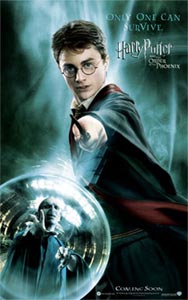
Harry Potter The Order of the Pheonix
Starring: Daniel Radcliffe, Rupert Grint, Emma Watson, Robbie Coltrane, Ralph Fiennes, Michael Gambon, Richard Griffiths, Brendan Gleeson, Gary Oldman, Alan Rickman, Imelda Staunton
Director David Yates
In "Harry Potter and the Order of the Phoenix," Harry returns for his fifth year of study at Hogwarts and discovers that much of the wizarding community is in denial about the teenager's recent encounter with the evil Lord Voldemort, preferring to turn a blind eye to the news that Voldemort has returned. Fearing that Hogwarts' venerable Headmaster, Albus Dumbledore, is lying about Voldemort's return in order to undermine his power and take his job, the Minister for Magic, Cornelius Fudge, appoints a new Defense Against the Dark Arts teacher to keep watch over Dumbledore and the Hogwarts students.
But Professor Dolores Umbridge's Ministry-approved course of defensive magic leaves the young wizards woefully unprepared to defend themselves against the dark forces threatening them and the entire wizarding community, so at the prompting of his friends Hermione and Ron, Harry takes matters into his own hands. Meeting secretly with a small group of students who name themselves "Dumbledore's Army," Harry teaches them how to defend themselves against the Dark Arts, preparing the courageous young wizards for the extraordinary battle that lies ahead.
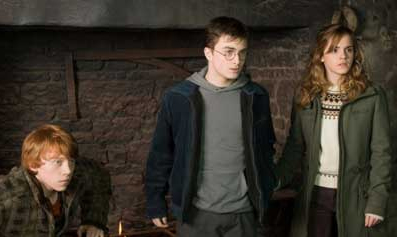
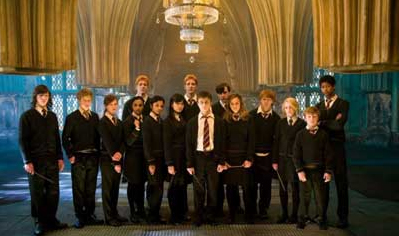
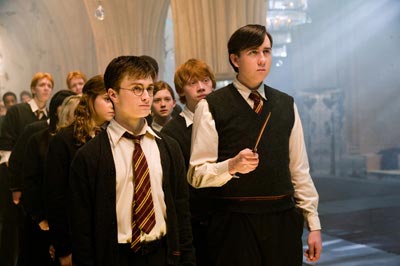
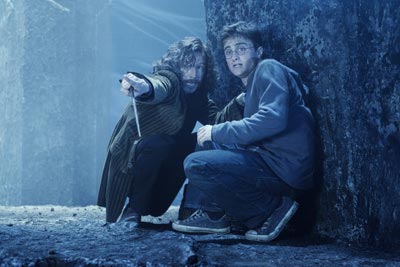
Director David Yates
In "Harry Potter and the Order of the Phoenix," Harry returns for his fifth year of study at Hogwarts and discovers that much of the wizarding community is in denial about the teenager's recent encounter with the evil Lord Voldemort, preferring to turn a blind eye to the news that Voldemort has returned. Fearing that Hogwarts' venerable Headmaster, Albus Dumbledore, is lying about Voldemort's return in order to undermine his power and take his job, the Minister for Magic, Cornelius Fudge, appoints a new Defense Against the Dark Arts teacher to keep watch over Dumbledore and the Hogwarts students.
But Professor Dolores Umbridge's Ministry-approved course of defensive magic leaves the young wizards woefully unprepared to defend themselves against the dark forces threatening them and the entire wizarding community, so at the prompting of his friends Hermione and Ron, Harry takes matters into his own hands. Meeting secretly with a small group of students who name themselves "Dumbledore's Army," Harry teaches them how to defend themselves against the Dark Arts, preparing the courageous young wizards for the extraordinary battle that lies ahead.




MORE




